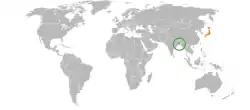Bangladesh–Japan relations
Bangladesh–Japan relations (Bengali: বাংলাদেশ-জাপান সম্পর্ক, Japanese: 日本とバングラデシュの関係) were established on 10 February 1972.[1] By 2015, the bilateral annual trade of these two countries was US$2.3 billion.[2][3]
 | |
Bangladesh |
Japan |
|---|---|
Bangladesh and Japan have historically been strong bonded nations. The relationship between Bengali and Japanese people is centuries old.
In a BBC World Poll, 71% of Bangladesh had a favorable view of Japan, making Bangladesh one of the most pro-Japanese countries in the world.[4]
Historical background
The relation between Bangladesh and Japan which was in trouble during the British period and Partition of Bengal 1947 got regular in mid-1950 when the Consular Mission of Japan (CMJ) in Dhaka started to make contact with people-to-people.[5]
Embassies
On 11 February 1972, Bangladesh opened an embassy in Tokyo, and Japan opened an embassy in Bangladesh.[6] The Embassy of Japan in Bangladesh is located at 5 & 7, Dutabash Road, Baridhara, Dhaka,[7] where it has been located since the early 1990s.
Trade and investment
Japan is Bangladesh's 7th-largest export market as of 2015;[8] imports from Bangladesh make up 0.17% of all Japanese imports.[9] Common imports from Bangladesh to Japan include textiles, leather goods, and shrimp.[3] By 2004, Japan had become Bangladesh's fourth-largest source of foreign direct investment, behind the United States, United Kingdom, and Malaysia. Japan is also a significant source of development aid to Bangladesh.[10]
Japan's political goals in its relationship with Bangladesh include gaining support for their bid to join the United Nations Security Council, and securing markets for their finished goods.[10]
In 2001, there were about 9,500 Bangladeshis in Japan. Japan recognized the People's Republic of Bangladesh on 10 February 1972, soon after its independence. Both parties celebrated thirty years of relations in 2002.
Seven Japanese nationals died in the 1 July 2016 Dhaka Attacks by terrorists.[11] Japanese Prime Minister Shinzo Abe said "I feel profound anger that so many innocent people have lost their lives in the cruel and nefarious terrorism."[12]
References
- Japan-Bangladesh Relations, Japan: Ministry of Foreign Affairs, March 2008, retrieved 9 April 2008
- "What did Japan export to Bangladesh in 2015?". The Atlas of Economic Complexity. Retrieved 22 October 2017.
- "What did Bangladesh export to Japan in 2015?". The Atlas of Economic Complexity. Retrieved 22 October 2017.
- "Chapter 4: How Asians View Each Other". Pew Research Center. 14 July 2014.
- "Bangladesh-Japan together at 40". The Daily Star. 8 February 2012.
- "Chronologies". Embassy of Japan in Bangladesh.
- "Embassy of Japan in Dhaka, Bangladesh". EmbassyPages.com. Retrieved 28 January 2017.
- "Where did Bangladesh export to in 2015?". The Atlas of Economic Complexity. Retrieved 22 October 2017.
- "Where did Japan import from in 2015?". The Atlas of Economic Complexity. Retrieved 22 October 2017.
- Ashrafur Rahman, Syed (October–December 2005), "Japan's Political and Economic Goals in Bangladesh" (PDF), Asian Affairs, 27 (4): 41–50, archived from the original (PDF) on 28 May 2008, retrieved 9 April 2008
- hermesauto (3 July 2016). "Japan victims' families head to Bangladesh in shock after attacks". The Straits Times. Retrieved 22 January 2017.
- hermesauto (2 July 2016). "Seven Japanese involved in Bangladesh hostage attack confirmed dead". The Straits Times. Retrieved 22 January 2017.
Further reading
- Biśvāsa, Sukumāra (2005). Japan-Bangladesh Relations, 1972-1990. Mowla Brothers. ISBN 984-410-435-1.
- Abdul Matin, Muhammad (2005), "East Asian Security: A Bangladesh Perspective", in Sisodia, N. S.; Naidu, G. V. C. (eds.), Changing Security Dynamic in Eastern Asia: Focus on Japan, Bibliophile South Asia, pp. 504–528, ISBN 81-86019-52-9
